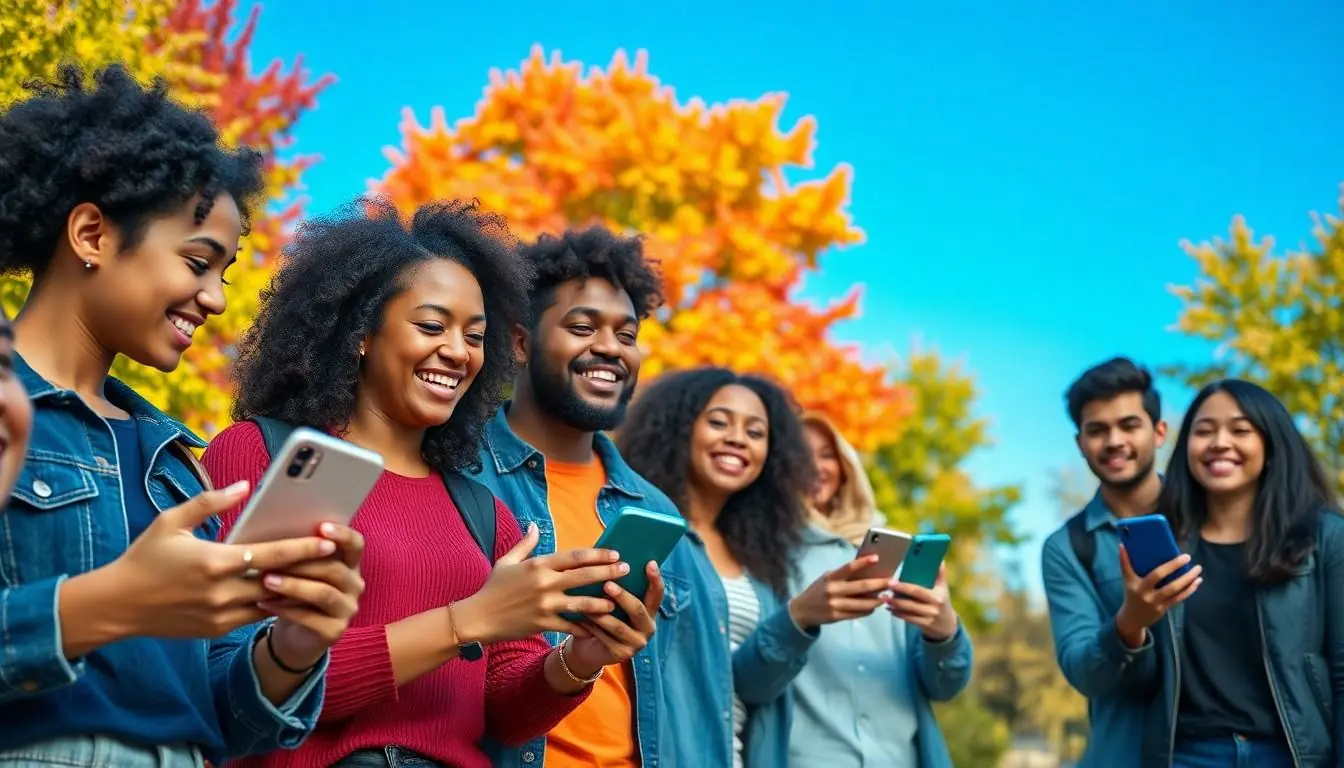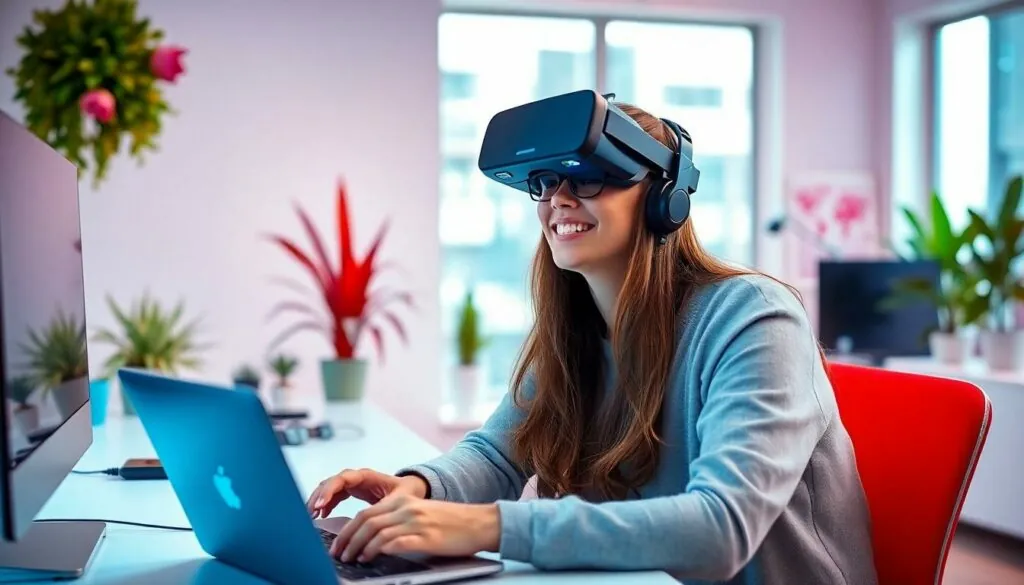Table of Contents
ToggleSocial media has come a long way from awkward selfies and cat memes, but what’s next? As technology evolves faster than a teenager can post a TikTok dance, the future of social media promises to be a wild ride. Imagine a world where virtual reality meets your daily scroll, and your favorite influencers are holograms popping up in your living room. Sounds like sci-fi? Maybe, but it’s closer than you think.
Overview of Social Media Evolution
Social media began as a platform for basic communication, emerging with text-based platforms in the early 2000s. With the introduction of photo sharing, users embraced visuals, leading to the rise of platforms like Instagram and Snapchat. These changes marked a shift from simple status updates to content that prioritizes engagement through imagery.
User-generated content gained prominence, encouraging businesses to adopt social media for brand promotion. Companies began utilizing these platforms to connect with audiences, driving a surge in targeted advertising methods. Data from Sprout Social indicates that 70% of consumers look to social media for brand engagement.
Emerging technologies also play a significant role in social media’s future. Virtual reality tools enable immersive experiences, allowing users to interact in three-dimensional spaces. As augmented reality applications grow, filtering and interactive features enhance user experience, making digital interactions feel more personal and engaging.
Many platforms focus on facilitating community-building through niche groups, establishing deeper connections among users with shared interests. Engagement within these groups enhances loyalty and fosters a sense of belonging. Platforms are continuously evolving to incorporate stronger verification processes to ensure user security and authenticity.
The future of social media hinges on integration with advanced technologies like artificial intelligence. Algorithms will provide personalized content, predicting user preferences more accurately. Experts suggest that these innovations will create an evolving landscape where users experience social media in ways never imagined before.
Current Trends Influencing the Future of Social Media

Social media continues to evolve, influenced by several key trends. These trends shape how users engage with content and each other.
Rise of Video Content
Video content dominates social media platforms today. Approximately 80% of all internet traffic is projected to come from videos by 2025. This growth prompts users to favor visual storytelling over text, enabling quick consumption and sharing. Platforms like TikTok and Instagram Reels exemplify this shift, attracting millions of daily views. The demand for engaging video content drives brands to invest heavily in video marketing strategies. Consequently, influencers utilize live streaming to interact authentically with their audiences, reflecting a preference for dynamic interactions.
The Impact of Artificial Intelligence
Artificial Intelligence (AI) plays a significant role in shaping social media landscapes. It personalizes user experiences by analyzing behavior and preferences, resulting in tailored content. Nearly 70% of consumers express interest in personalized recommendations. Algorithms refine the content users see, boosting engagement rates and retention. Furthermore, AI enhances target advertising, allowing businesses to reach specific demographics effectively. AI-driven chatbots provide 24/7 customer service, improving user satisfaction. Advances in AI technologies will likely redefine social media interactions, pushing toward a more intelligent and integrated online environment.
Emerging Platforms and Technologies
Social media’s future hinges on the emergence of innovative platforms and technologies that redefine user interactions. Key among these are virtual reality and augmented reality, which promise transformative experiences.
Virtual Reality and Augmented Reality
Virtual reality immerses users in digital environments, facilitating deeper emotional connections. Augmented reality overlays digital images on the real world, enhancing social sharing. These technologies engage users in unprecedented ways, with brands utilizing AR filters to create interactive ads. Social media platforms like Snapchat leverage AR to increase user engagement with creative tools. Reports indicate that VR and AR markets could reach $209.2 billion and $198.5 billion respectively by 2025. Applications of VR in virtual events and social gatherings are increasing, enhancing user engagement significantly.
Blockchain in Social Media
Blockchain technology enhances social media platforms by ensuring data security and privacy. It provides decentralized control, allowing users authority over their data. Some platforms explore blockchain for transparent moderation processes and to combat misinformation. A survey from Deloitte reveals that 66% of users prioritize platforms that safeguard their data. Additionally, cryptocurrency integration could facilitate direct transactions between users and creators, rewarding content generation. As blockchain adoption rises, social media networks will likely shift toward enhanced user trust and engagement, paving the way for innovative monetization strategies.
Changes in User Behavior and Expectations
User behavior is evolving as social media platforms adapt to new technologies and user demands. This evolution creates a continuous shift in user expectations and interactions.
Privacy Concerns
Concerns about privacy dominate discussions surrounding social media. Users increasingly prioritize platforms that ensure data security. According to a Deloitte survey, 66% of users specifically favor platforms protecting their data. With the rise of blockchain technology, social media now offers decentralized control over user information. This technological advancement encourages transparent moderation to combat misinformation. It’s becoming essential for platforms to address these concerns to maintain user trust and loyalty.
Demand for Authenticity
Authenticity drives user engagement on social media. Users gravitate towards genuine content that reflects real experiences. Brands must embrace this shift to connect meaningfully with audiences. The trend toward video content requires organizations to showcase unfiltered narratives. Engaging storytelling resonates with users, leading to higher levels of trust and loyalty. Businesses that prioritize authenticity often see increased interaction rates, making it a fundamental aspect of modern social media strategies.
The future of social media promises to be an exciting landscape filled with innovative technologies and evolving user expectations. As platforms embrace virtual and augmented reality, users will likely experience more immersive interactions than ever before. This shift not only enhances engagement but also fosters deeper emotional connections between brands and consumers.
With the rise of blockchain technology, users can expect greater control over their data and a more transparent online environment. As privacy concerns continue to shape user preferences, brands must adapt by prioritizing authenticity and meaningful connections. The integration of video content and AI will further redefine social media, ensuring that it remains a dynamic and essential part of modern communication.







